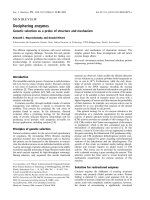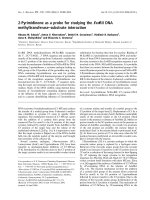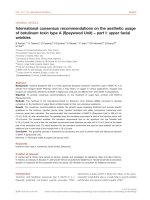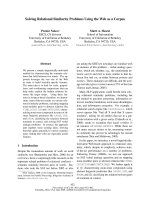Aesthetic Animism Digital Poetry as Ontological Probe potx
Bạn đang xem bản rút gọn của tài liệu. Xem và tải ngay bản đầy đủ của tài liệu tại đây (3.45 MB, 28 trang )
Aesthetic Animism
Digital Poetry as Ontological Probe
David (Jhave) Johnston
Concordia University. OBX, NT2, TML
NAVIGATIONAL DISCLAIMER
This presentation offers the occasional satellite imagery of
Painting (video) & Poetry (programming)
DEFINITION TIME
Aesthetic Animism
attribution of aliveness based on perceived beauty:
a combination of motion, belonging, intention and appropriateness.
MOTIVATION SPIME
There are ontological implications of malleable typography.
Creative practitioners and viewer-readers of digital poetry
experience alternative ontologies.
TERMINOLOGICUS
Multimedia means that the
term ‘text’ is insufficient.
TERMINOLOGICUS
'TAV'
(Text-Audio-Visual)
'TAVT'
(a TAV in a 3D Territory)
'TAVIT'
(an Interactive TAVT)
I have no illusions or expectations that these terms will achieve widespread adoption, but am certain that some terms
like these will of necessity emerge to concisely and accurately convey the difference between text, tav, tavt and tavit.
CLAIM
Elements of future
languages will be
perceived as if they
were organisms.
Ontology stems from the Greek verb
ontic: of being. It is the study of what
exists, what is real, and what has come
to be accepted as being real. Language is
becoming visually and palpably different
from what it was prior to computation.
New means of expression are emerging. I
explore what this means for the reception
of poetry. Poetry is crossing an
ontological membrane from being an
abstract printed system to becoming a
system of quasi-entities: words and
phrases that are dimensional, kinetic,
interactive, code-full, context-aware and
tactile.
ANIM(ATION)ISM
The link between poetry and
animism is ancient: oral poetry
arose in the mouths of oracles
who read messages in matter.
Advertising has used life-like mobile
text for decades. And I am far from the
first to link animation and animism.
Animation has been referred to as the
'illusion of life' by the Lumière
brothers, Walt Disney and Orson
Welles.
Etymologically animation is either
endowing with movement or endowing
with life (Cholodenko. 1991). I am also
not the first to link digitally animated
text to notions of aliveness. Jason
Lewis and Alex Weyers Active Text
(1999) prototype application was
called It's Alive!
Cyrille Henry’s (2007)
Verbiage Végétal
draws trees out of words
drawn from internet branchings.
STRATEGIES
Practice-Led Software-Studies
My empirical research-creation practice
creating and exhibiting (both physically and
online) digitally-mediated language-art.
My interpretive research examines the
literary, aesthetic and ontological implications
of digital poetry on collective attitudes toward
life.
TUR(N)ING
Richard Rorty identified philosophy as a
series of turns.
Like the head of a small bird, the head of
philosophy pivots around to find new
concerns each generation.
In the early twentieth century, Wittgenstein’s
linguistic turn precipitated a concentration on
language as fundamental metaphor. In 1994,
the pictorial turn (of W.T.J. Mitchell) proposed
a visual generation, ocularcentric and
inundated in photons. The pictorial turn is
living in parallel competition (and partial
completion) with many other concurrent
turns: the media turn, the hybrid turn, the
non-linear turn, the interactive-tangible turn,
the agency turn, the augmented turn and the
network turn.
Turns are
Converging.
The primary turns of
the 20th century
Language,
Pictorial,
Media
are converging
around the concept
of life.
LIVING LANGUAGE
where language and the pictorial
meet new-media 3D-representations,
there will be a re-turn toward
aesthetic animism, animism without
precedent: a digital animism that
includes language as a proto-animal.
This will be the turn toward living
language
when tavits
become
indiscernible
from reality
SPIMES : POEM VS PIME
Words, phrases, sentences,
paragraphs and books are data-
structures capable of accumulating
memories.
When these memories plug into a
distributed intelligence (networked
software), they might become capable
of experiences.
PIMES will be
poems
that know
who wrote them
& who has read
them
A MODEST PROPOSAL
Technological changes in the way
digital poets are producing and
handling language provide a
valuable diagnostic for examining
subtle modulations of collective
belief systems, specifically attitudes
toward life and technology.
As perception
of living
changes so
does the
world.
MECHANISTIC ANIMISM
I accept the possibility that the
materialist worldview of things as
inanimate represents an interim
viewpoint. I redraw the anima mundi
to include apparently inanimate
matter (such as integrated circuits)
and abstract systems (such as
language).
“I think it is
legitimate then
to talk about
the cell as a
cognizer”
Katherine Hayles in Ricardo. p. 49
BETWEEN BOOLE AND DISNEY
Deterministic finite state automaton
“are widely used in text editors for pattern matching, in
compilers for lexical analysis, in web browsers for html
parsing, and in operating systems for graphical user
interfaces. They also serve as the control unit in many
physical systems including: vending machines, elevators,
automatic traffic signals, and computer microprocessors.
Also network protocol stacks and old VCR clocks. They also
play a key role in natural language processing and machine
learning.”
are at the core of how machines think.
“Finite State Automata,” />The terms
behaviour,
model,
transitions and
actions occur
in both
animation and
Finite State
Automata.
MEDIATA ANIMATUS
Animation need not dance, but be
animated in the sense of listening and
responsive to contact from users and
networks. Auto-completion processes
(as in auto form fillers and Google
Scribe) are animations. They
anticipate users with auto-complete
suggestions and act to provide
services. Auto-page turners that
recognize where gaze is and turn to
next block of text are animations.
Mediation implies animation; and
animation implies mediation.
Both finite
state
machines and
cartoons aim
to transform
data into a
recognizable
life-like
format.
THREE ARGUMENTS FOR
AESTHETIC ANIMISM
1. Evolution
2. Prosthesis
3. Assimilation
EVOLUTION
The separation between language and nature as methods for aesthetic experience (a separation that emerged with inscription
and was mass-disseminated by the printing press) will be resolved when digital language adopts features of organic life and is
perceived as natural and natured.
EVOLUTION
Related software case-study: Mudbox
EVOLUTION
Specular depth, refraction indices, inverse kinematics and other terminology from 3D modelling may prove useful as digital semiotic indices
And literary terms. As may easing equations, matrices transforms and splices.
PROSTHESIS
Languaged media is technology, therefore (following McLuhan) it is an extension of our body. Our bodies are perceived as alive.
Therefore the more mediated language becomes, the more it will seem alive. Eventually its abstract foundation may be forgotten.
PROSTHESIS
Related software case-study: Mr. Softie
PROSTHESIS
Unlike material objects which when rendered do not gain dimensional qualities that they did not previously possess,
a dimensional animatable body is being created for letterforms that they previously never possessed.
ASSIMILATION
Language is slowly adopting features of a real object in a real world. The assimilation of language into
audio/visual interactive environments occurs in stages until it belongs like a mitochondria to images.









